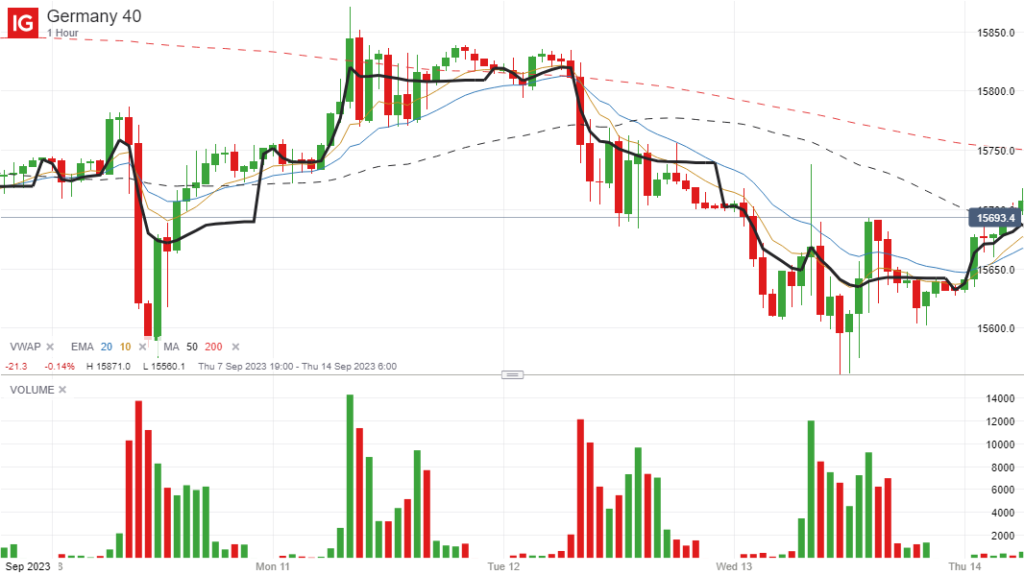Introduction to the DAX
The DAX, short for Deutscher Aktien, is the main German stock index that features 40 of the largest blue-chip companies, including SAP, Siemens, Airbus, Deutsche Telekom AG., Mercedes-Benz and Volkswagen AG.
Therefore it is commonly used to indicate the health of the German stock market and the strength of the German economy in general.
The DAX is also a very good index to trade because similar to the NASDAQ, it is very volatile and can easily trade within a range of 100-200 points each day (the latest average trading range is around 150 points according to the ATR indicator), making it ideal for day traders.
German Stock Exchange Trading Hours
The German stock market opens at 9.00 AM local time, which is 8.00 AM if you are based in the UK, like myself, and is open for 8.5 hours each day, closing at 5.30 PM local time (4.30 PM UK time).
So it is quite a long trading session, but like any market, there are certain times of the day that tend to be more profitable to trade than others.
The Best Hours to Trade the DAX
I trade the DAX quite a lot and in my opinion, the best time of the day to trade the DAX is between 9.00 and 11.00 AM local time (or 8.00-10.00 AM UK time), ie the first two hours of the trading session.
This is the time when trading volumes are at their highest (as indicated in the hourly chart of the DAX below) and you will generally see some big price moves during this time, which is obviously what you want to see as a short-term day trader.

You need to be a little careful because the DAX has a tendency to open in one direction and then reverse and trend in the opposite direction in the first 5-30 minutes, but this also represents opportunities because the high or the low of the day will often be posted in these first two hours.
If you have the patience to wait for the market to settle down, you can potentially capture a large part of the trend each day once it starts to establish itself.
If you feel that this opening period is a little too volatile for your own particular trading style, you may prefer to trade the two pre-market hours from 7-9 AM local time or 6-8 AM UK time instead.
This is another good time to trade because the market will often make a move in one direction or the other leading up to the market open, giving you the chance to potentially capture some early profits.
The only drawback is that the spreads are often slightly wider pre-market, but otherwise it’s a nice time to trade the DAX.
The Worst Hours to Trade the DAX
In my experience, the worst time of the day of trade the DAX is between 11.00 AM – 13.00 PM local time (or 10.00 AM – 12.00 PM UK time) because trading volumes really start to fall away during this time of the day and it becomes a lot less volatile with smaller price movements.
It’s essentially a dead zone because the first two hours of the day have just passed and the market is essentially just waiting for the US markets to open later in the day.
So it is clearly not a great time to try to make money as a day trader.
The Afternoon Session
With regards to the afternoon session, the DAX will tend to move a lot more than the mid-morning session, as it tends to move in line with the US indices, but because you have a limited time to trade (and close out your positions) up until the market closes at 5.30 PM local time, it is not necessarily a good time to trade the DAX because of these constraints.
You don’t really want to run the risk of having to let your positions continue running after market hours when the spreads are wider, or overnight when there are additional fees to pay.
It is much better to trade the US indices instead during the European afternoon session because you have longer to trade, and the first few hours of the US session will give you more than enough opportunities to hit your daily profit target because of the big opening price moves.
Conclusion
So to conclude, if you are looking to trade the main German index on a regular basis, the best hours of the day to trade the DAX are 9.00 AM – 11.00 AM local time, or 8.00 AM – 10.00 AM UK time (in my experience) because this is when you will often see the biggest price swings.
However it is also worth considering the two-hour pre-market session too because although the price moves will be smaller, there will often be a clear push in one direction, which can be very profitable to trade.

Leave a Reply